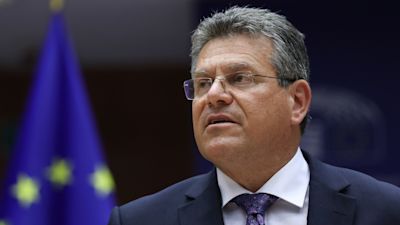EU proposes 'significant changes' to Brexit deal in bid to satisfy UK but agreement unlikely

ITV News Correspondent Peter Smith explains the significance of the EU's proposal
The EU has proposed "significant changes" to a key Brexit agreement in a bid to satisfy the UK, after Boris Johnson's chief negotiator said he would be prepared to suspend the Northern Ireland Protocol entirely if a consensus was not reached.
An EU official said changes to the protocol go "far beyond tinkering at the edges" of the agreement, but the bloc is refusing to renegotiate how the deal is governed - a red line for the UK - meaning an agreement is still unlikely to be found.
The Northern Ireland Protocol, which was agreed as part of the Brexit deal signed in 2019, is designed to protect peace on the island of Ireland by ensuring there is no border there - but it means there are checks on goods and services flowing between NI and the rest of the UK.
The EU said it is prepared to remove 80% of official checks on a wide range of agrifood products - including sausages, which have been a key area of contention - in a bid to satisfy the UK.
And it will remove more than half of the customs checks on other British goods entering Northern Ireland, such as car parts - so long as the UK agrees to the proposals.
This will be made possible by extending the description of “goods not at risk” of entering the EU to a wider range of products.
In return for fewer checks the EU will require more data to do proper market surveillance.
The EU said it was also prepared to change legislation to ensure no disruption of medical supplies into Northern Ireland. Under the original terms of the protocol, the region was to fall within the EU regulatory zone for medicines from 2022 – a move that would have restricted the ability to import products from Great Britain.
On the movement of agrifood, the bloc said a “bespoke Northern Ireland specific solution” would mean movement of chilled meats will be control free, but additional labelling will be required.
European Commission vice-president Maros Sefcovic has said his proposals are a "direct and genuine" response to concerns raised.
Following Mr Sefcovic's proposals, a spokesperson for the UK government said it was "studying the detail" of the EU's suggestions and "will of course look at them seriously and constructively.
"The next step should be intensive talks on both our sets of proposals, rapidly conducted, to determine whether there is common ground to find a solution.
“Significant changes which tackle the fundamental issues at the heart of the Protocol, including governance, must be made if we are to agree a durable settlement which commands support in Northern Ireland.
“We need to find a solution which all sides can get behind for the future, which safeguards the Belfast (Good Friday) Agreement, and which puts the UK-EU relationship on a stronger footing. We are ready to work hard with this in mind."
So why is the UK unlikely to agree?
Despite all these concessions, comments from UK chief Brexit negotiator Lord David Frost earlier on Wednesday suggest the proposals will not satisfy the British government.
That's because the EU is refusing to budge on governance of the deal, with the UK insisting that the European Court of Justice (ECJ) should have no role in arbitration of any potential trade disputes.
An EU official said insisting on issues of a constitutional nature like ECJ governance, which have little impact on trade, "will not lead us anywhere helpful".
"There won’t be any further negotiations on governance," the official said.
Under the terms of the deal struck by the UK and EU in 2019, the ECJ would be the final arbitrator in any future trade dispute between the two parties on the operation of the protocol.
The UK now wants to remove that provision and replace it with an independent arbitration process - something the EU is very unlikely to agree to.
But Lord Frost said the reach of the European Court of Justice (ECJ) was a key issue.
He told broadcasters: "The problem with the protocol at the moment is that EU law, with the ECJ as the enforcer of it, is applied in Northern Ireland without any sort of democratic process.
"So that, I think, has to change if we're to find governance arrangements that people can live with."
Dominic Cummings, the PM's former chief adviser, earlier suggested that the UK had acted in bad faith when it negotiated the Brexit deal, indicating that it was never the intention to stick to it.
The comment led Ireland to issue a warning to countries around the world that they should not work with the UK because it "doesn't necessarily keep its word and doesn't necessarily honour the agreements it makes".
Asked if he did act in bad faith, Lord Frost said: "We negotiated to find a result, to get an agreement and of course, look at our actions."
Speaking ahead of an EU press conference setting out the proposals, the Cabinet minister said he would look "very carefully and positively" at what is on the table.
"We now need an intensive talks process and to try and find an agreement that everybody can get behind."
One Month on the Shankill: Watch an extended eyewitness report as ITV News gained access to the Shankill Road loyalist community earlier this year following violence, as tensions rose over the Northern Ireland Brexit protocol.